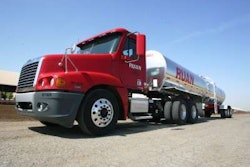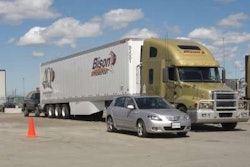Trade using surface transportation between the United States and its North American Free Trade Agreement partners Canada and Mexico was 35.4 percent lower in May 2009 than in May 2008, the biggest decline from the same month of the previous year on record, according to the Bureau of Transportation Statistics of the U.S. Department of Transportation.
BTS reported that the value of North American surface trade dropped to $47.9 billion in the fifth consecutive month with a year-to-year decline of greater than 27 percent. Imports from Canada and Mexico to the United States in May were down 38.1 percent from May 2008, while exports from the United States declined 32.0 percent.
U.S.-Canada surface transportation trade totaled $29.2 billion in May 2009,
down 40.3 percent compared to May 2008. U.S.-Mexico surface transportation trade totaled $18.6 billion in May 2009, down 26.0 percent compared to May 2008.
Tonnage drops in June ATA index down 13.6% year-over-year
The American Trucking Associations’ advanced seasonally adjusted (SA) For-Hire Truck Tonnage Index fell 2.4 percent in June from the May level. In May, SA tonnage jumped 3.2 percent. June’s decrease, which lowered the SA index to 99.8 (2000=100), wasn’t large enough to completely offset the robust gain in the previous month. The not seasonally adjusted (NSA) index, which represents the change in tonnage actually hauled by the fleets before any seasonal adjustment, equaled 107.3 in June, up 5.2 percent from May.
Compared with June 2008, tonnage fell 13.6 percent, which surpassed May’s 11 percent year-over-year drop. June’s contraction was the largest year-over-year decrease of the current cycle, exceeding the 13.2 percent drop in April. ATA Chief Economist Bob Costello said truck tonnage is likely to be choppy in the months ahead.
“While I am hopeful that the worst is behind us, I just don’t see anything on the economic horizon that suggests freight tonnage is about to rise significantly or consistently,” Costello said. “The consumer is still facing too many headwinds, including employment losses, tight credit and falling home values, to name a few, that will make it very difficult for household spending to jump in the near term.”
Costello also noted that inventories, relative to sales, are still too high in much of the supply chain, especially in the manufacturing and wholesale industries. “As a result, this is likely to be the first time in memory that truck tonnage doesn’t lead the macroeconomy out of a recession,” he said. “Today, many new product orders can be fulfilled with current inventories, not new production, thus suppressing truck tonnage.”
ATA calculates the tonnage index based on surveys from its membership. The report includes month-to-month and year-over-year results, relevant economic comparisons and key financial indicators. The baseline year is 2000.
In Brief
Evergreen Transportation Inc. filed for reorganization under Chapter 11 in the U.S. Bankruptcy Court in Mobile, Ala. The Evergreen, Ala.-based company has received credit approval for $5 million in debtor-in-possession financing from General Electric Credit Corp. and plans to use the financing to fund continuing normal day-to-day operations and its post-filing obligations.
FTR Associates reduced its projection for 2010 North American production of Class 8 trucks by 12 percent, even as the market continues to stabilize and the outlook for 2009 remains unchanged. “At the moment, demand for truck freight transport is still declining and is projected to bottom out in the fourth quarter,” says Eric Starks, FTR president. “In our view, improvement sufficient to drive new equipment purchases will not occur until 2011.”
National Conference on Weights and Measures voted to remove consideration of both voluntary and mandatory standards for selling fuel using a standard benchmark of 60 degrees as opposed to the current volume-based method. NCWM cited consensus against automatic temperature compensation as well as economic cost factors, lack of consumer benefit and absence of uniformity in the marketplace.
NationaLease posted a three-minute video on its www.nationalease.com website to provide some questions and answers for businesses that are weighing the pluses and minuses of owning or leasing equipment.












